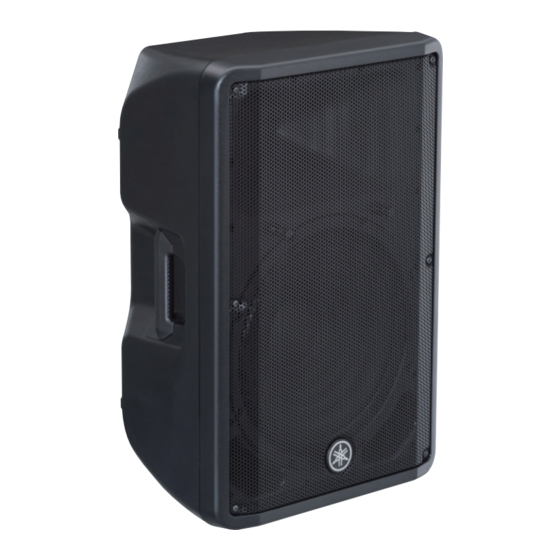Yamaha DBR12 Owner's Manual - Page 4
Browse online or download pdf Owner's Manual for Speaker System Yamaha DBR12. Yamaha DBR12 10 pages. Dbr series powered speaker system
Also for Yamaha DBR12: Owner's Manual (2 pages), Owner's Manual (6 pages)

CAUTION
• Before doing any installation or construction work, consult with your Yamaha dealer.
• For optimum safety, the installation should be checked thoroughly at regular intervals. Some fittings may deteriorate
over extended periods of time due to wear and/or corrosion.
• When choosing the installation location, suspension wire and mounting hardware, make sure all are strong enough to
support the weight of the speaker.
• Make sure to take measures to prevent the speaker from falling down in the event of a installation failure.
• When installing the safety wire to the wall, install it higher than the wire's attachment point on the speaker, with as little
slack as possible. If the wire is too long, and the speaker happens to fall, the wire may snap as a result of too much
strain.
Yamaha cannot be held responsible for damage or injury caused by insufficient strength of the support
structure or improper installation.
Installation using separately sold Yamaha speaker
brackets
Attach the bracket to two screw holes at the bottom of the unit using commercially available screws
(M8 x 16 mm) or eye bolts (M8 x 15 mm). For details on installing the bracket, refer to the corresponding
manual.
❚
Using the BWS251-300 or BWS251-400 wall mounting
bracket
Maximum tilt
angle
❚
Using the BCS251 ceiling bracket
The tilt angle depends on the position relation between the speaker
and the wall. The maximum downward tilt angle is shown in the
following chart.
Maximum tilt angle
DBR15
DBR12
DBR10
Max. 45°
Installation E
BWS251-300
BWS251-400
8°
11°
20°
(Pullback point for DBR15
and DBR12 only)
17.5°
23°
35°
